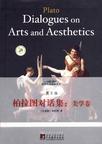柏拉图对话集
出版时间:2012-1 出版社:中央编译出版社 作者:柏拉图 页数:541 字数:580000
Tag标签:无
内容概要
PLATO HAD a love-hate relationship with the arts. He must have
had some love for the arts, and his influence on western culture
generally is a very strong one, and this includes a strong
influence on the arts, and on theories of art.
Beauty,Justice, and Circle are all examples of what Plato called
Forms or Ideas. For Plato, these Forms are perfect Ideals, but they
are also more real than physical objects. He called them "the
Really Real", so art is imitation, and the best human life is one
that strives to understand and to imitate the Forms as closely as
possible.
作者简介
PLATO(424/423 BC-348/347 BC), was a Classical Greek
philosopher, mathematician, student of Socrates, writer of
philosophical dialogues, and founder of the
Academy in Athens, the first institution of higher earning in the
Western world, just as A.N. Whitehead says:
The safest general characterization of the European philosophical
tradition is that it consists of a series of footnotes to Plato, I
do not mean the systematic scheme of thought which scholars have
doubtfully extracted from his writings, I allude to the wealth of
general ideas scattered through them.
Plato's dialogues have been used to teach a range of subjects,
including philosophy, logic, educes, rhetoric, and mathematics.
书籍目录
I ION
INTRODUCTION
ION
II REPUBLIC(BOOKII、 BOOKIII、 BOOKX)
INTRODUCTION
REPUBLIC
III PHAEDRUS
INTRODUCTION
PHAEDRUS
IV HIPPIASMAJOR
V SYMPOSIUM
INTRODUCTION
SYMPOSIUM
VI PHILEBUS
INTRODUCTION AND ANALYSIS
PHILEBUS
VII LAWS (BOOKII)
INTRODUCTION AND ANALYSIS
LAWS(BOOK II)
章节摘录
版权页: In the Protagoras the ancient poets are recognized by Protagoras himself as the original sophists;and this family resemblance may be traced in the Ion.The thapsode belongs to the realm of imitation and of opinion:he professes to have all knowledge,which is derived by him from Homer,just as the sophist professes to have all wisdom,which is contained in his art of rhetoric.Even more than the sophist he is incapable of appreaating the commonest logical distinctions;he cannot explain the nature of his own art;his great memory contrasts with his inability to follow the steps of the argument.And in his highest moments of inspiration he has an eye to his own gains. The old quarrel between philosophy and poetry,which in the Republic leads to their final separation,is already working in the mind of Plato,and is embodied by him in the contrast between Socrates and Ion.Yet here,as in the Republic,Socrates shows a sympathy with the poetic nature.Also,the manner in which Ion is affected by his own recitations affords a lively illustration of the power which,in the Republic,Socrates attributes to dramatic performances over the mind of the performer.His allusion to his embellishments of Homer,in which he declares himself to have surpassed Metrodorus of Lampsacus and Stesimbrotus of Thasos,seems to show that,like them,he belonged to the allegorical school of interpreters.The circumstance that nothing more is known of him may be adduced in confirmation of the argument that this truly Platonic little work is not a forgery of later times. ION PERSONS OF THE DIALOGUE Socrates,Ion. SOCRATES Welcome,Ion.Are you from your native city of Ephesus? ION No,Socrates;but from Epidaurus,where I attended the festival of Asclepius. SOCRATES And do the Epidaurians have contests of rhapsodes at the festival? ION O yes;and of all sorts of musical performers. SOCRATES And were you one of the competitors-and did you succeed? ION I obtained the first prize of all,Socrates. SOCRATES Well done; and I hope that you will do the same for us at the Panathenaea. ION And I will,please heaven. SOCRATES I often envy the profession of a thapsode,Ion;for you have always to wear fine clothes,and to look as beautiful as you can is a part of your art.Then,again,you are obliged to be continually in the company of many good poets;and especially of Homer,who is the best and most divine of them;and to understand him,and not merely learn his words by rote,is a thing greatly to be envied.And no man can be a thapsode who does not understand the meaning of the poet.For the thapsode ought to interpret the mind of the poet to his hearers,but how can he interpret him well unless he knows what he means? All this is greatly to be envied. ION Very true,Socrates;interpretation has certainly been the most laborious part of my art;and I believe myself able to speak about Homer better than any man;and that neither Metrodorus of Lampsacus,nor Stesimbrotus of Thasos,nor Glaucon,nor any one else who ever was,had as good ideas about Homer as I have,or as many. SOCRATES I am glad to hear you say so,Ion;I see that you will not refuse to acquaint me with them. ION Certainly,Socrates;and you really ought to hear how exquisitely I render Homer.I think that the Homeridae should give me a golden crown. SOCRATES I shall take an opportunity of hearing your embellishments of him at some other time.But just now I should like to ask you a question:Does your art extend to Hesiod and Archilochus,or to Homer only? ION To Homer only;he is in himself quite enough. SOCRATES Are there any things about which Homer and Hesiod agree?
编辑推荐
《柏拉图对话集:美学卷(英文版)》散见于各篇对话中有关的艺术及美学方面的论述,是西方美学和艺术的重要源头,有关于艺术功用的探讨;有美与形式、质料之间的关系论述;有美的本质的对话,为后世的美学加解决审美体验等开了无数方便的法门。《柏拉图对话集:美学卷(英文版)》所选各篇均配有英国著名古典学家本•乔伊特撰写的导言,既对古希腊社会生活概貌有生动的介绍,又清晰地勾勒出柏拉图学说的基本构架,十分有益于初学者入门。
图书封面
图书标签Tags
无
评论、评分、阅读与下载
用户评论 (总计5条)
- 还没细看,但是总体来看不错。
- 印刷精美,版本权威,剑桥版的。
- 好东西大家都喜欢
- 充满智慧!!!
- 印刷有错漏,国内英文书最好买影印版!
